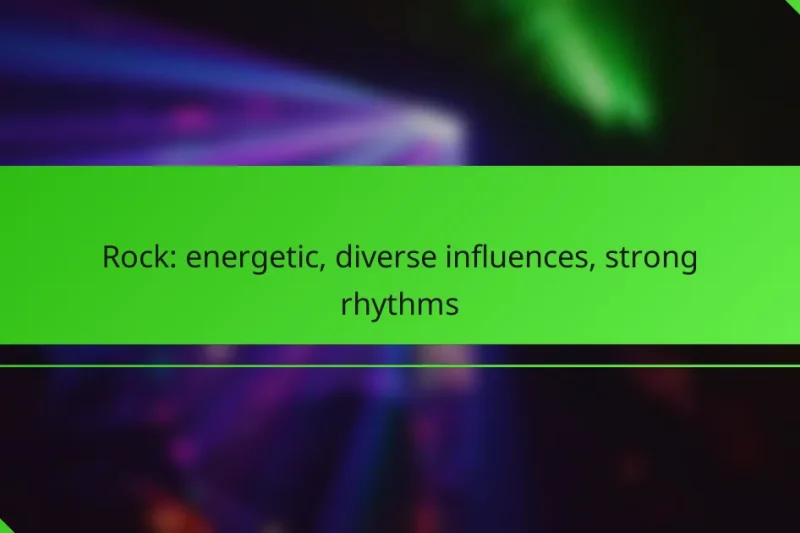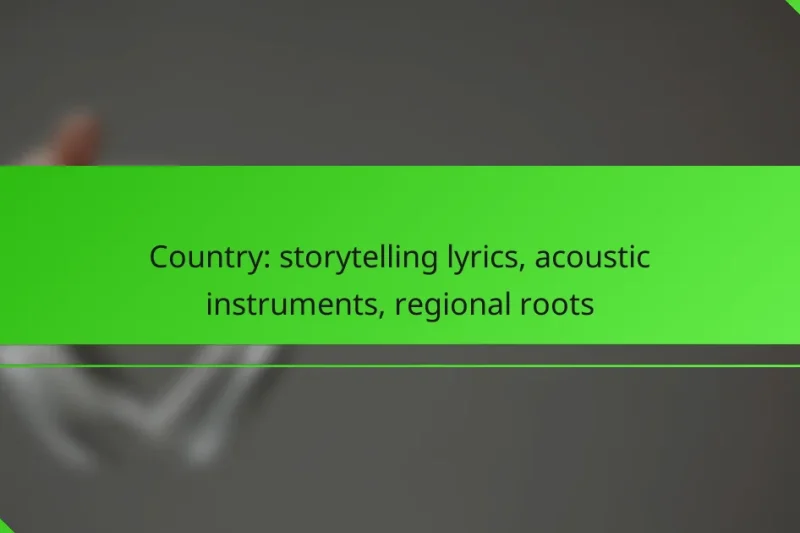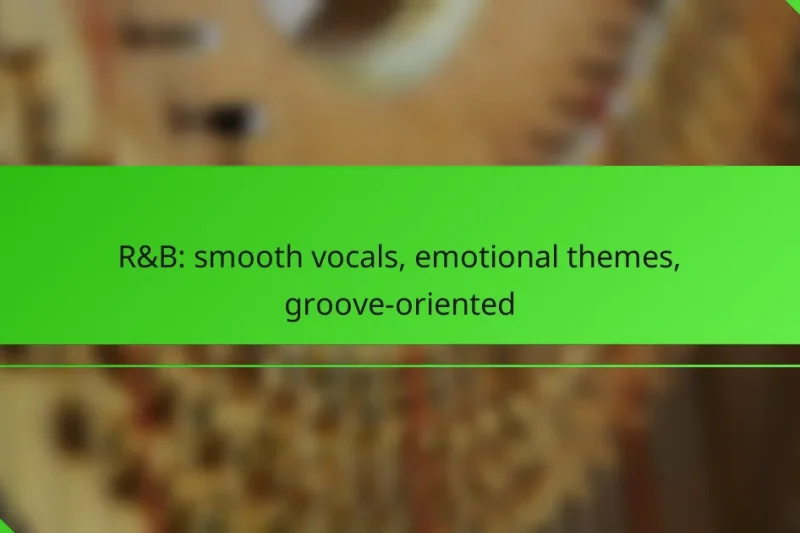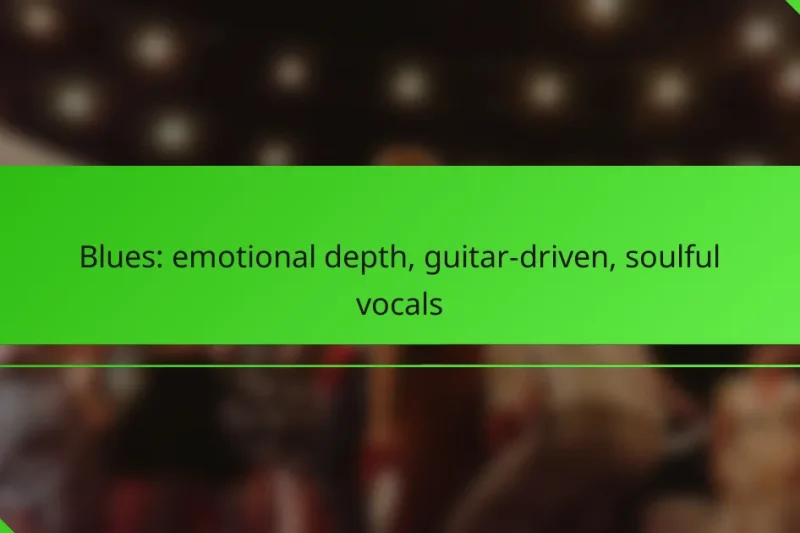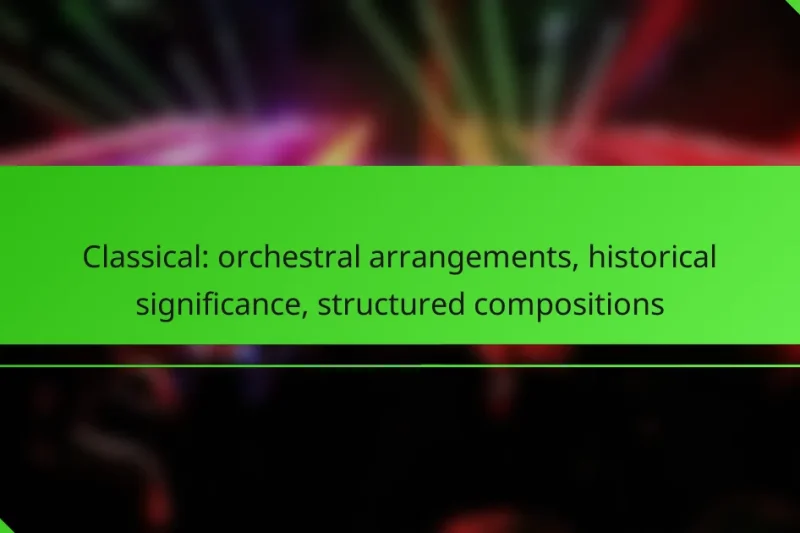Metal music is characterized by its aggressive sound and powerful vocals, creating an intense auditory experience … Metal: aggressive sound, powerful vocals, subgenre diversityRead more
Understanding Different Music Genres
Music genres play a crucial role in shaping cultural identity and reflecting the diverse experiences of people. In Canada, popular genres such as pop, rock, hip-hop, country, and electronic music showcase a rich tapestry of influences. By exploring the unique characteristics of each genre, listeners can deepen their appreciation for the variety of sounds and styles that resonate within the musical landscape.
Pop: catchy melodies, mainstream appeal, upbeat tempos
Pop music captivates listeners with its catchy melodies, upbeat tempos, and widespread mainstream appeal. These characteristics … Pop: catchy melodies, mainstream appeal, upbeat temposRead more
Rock: energetic, diverse influences, strong rhythms
Rock music is a vibrant genre characterized by its strong rhythms and energetic performances, making it … Rock: energetic, diverse influences, strong rhythmsRead more
Country: storytelling lyrics, acoustic instruments, regional roots
In Canada, storytelling lyrics are integral to acoustic music, imbuing it with emotional depth and cultural … Country: storytelling lyrics, acoustic instruments, regional rootsRead more
Electronic: synthesized sounds, club culture, innovative production
Electronic music is characterized by its innovative use of synthesized sounds, which are crafted through various … Electronic: synthesized sounds, club culture, innovative productionRead more
R&B: smooth vocals, emotional themes, groove-oriented
R&B is a genre celebrated for its smooth vocals and deep emotional themes, often exploring love, … R&B: smooth vocals, emotional themes, groove-orientedRead more
Blues: emotional depth, guitar-driven, soulful vocals
The blues is a genre that captivates listeners with its emotional depth, characterized by soulful vocals … Blues: emotional depth, guitar-driven, soulful vocalsRead more
Jazz: improvisational, complex harmonies, syncopated rhythms
Jazz is a dynamic musical genre characterized by its improvisational nature, complex harmonies, and syncopated rhythms. … Jazz: improvisational, complex harmonies, syncopated rhythmsRead more
Punk: fast tempos, rebellious themes, raw sound
Punk music is defined by its fast tempos, rebellious themes, and raw sound, creating a distinct … Punk: fast tempos, rebellious themes, raw soundRead more
Classical: orchestral arrangements, historical significance, structured compositions
Orchestral arrangements in classical music are pivotal in showcasing the intricate interplay between individual instruments and … Classical: orchestral arrangements, historical significance, structured compositionsRead more
What are the most popular music genres in Canada?
The most popular music genres in Canada include pop, rock, hip-hop, country, and electronic music. These genres reflect the diverse musical tastes across the country, influenced by various cultural backgrounds and regional preferences.
Pop music
Pop music is characterized by its catchy melodies and broad appeal, making it one of the most popular genres in Canada. Artists like Justin Bieber and Drake have significantly shaped the pop landscape, often blending elements from other genres.
When exploring pop music, consider its emphasis on production quality and radio-friendly formats. Many pop songs follow a verse-chorus structure, making them easily memorable and accessible to a wide audience.
Rock music
Rock music has a rich history in Canada, with bands like Rush and The Tragically Hip leading the way. This genre often features electric guitars, strong rhythms, and powerful vocals, appealing to a diverse range of listeners.
Canadian rock spans various subgenres, including classic rock, alternative rock, and punk rock. Fans appreciate the storytelling aspect of rock lyrics, which often reflect personal and social themes relevant to Canadian culture.
Hip-hop
Hip-hop has gained immense popularity in Canada, with artists like Drake and The Weeknd achieving international fame. This genre combines rhythmic vocal style with beats, often addressing themes of identity, culture, and social issues.
Canadian hip-hop artists frequently incorporate local slang and references, making their music relatable to Canadian audiences. The genre’s growth has led to vibrant local scenes in cities like Toronto and Vancouver.
Country music
Country music enjoys a dedicated following in Canada, particularly in rural areas and provinces like Alberta and Saskatchewan. Artists such as Shania Twain and Paul Brandt have brought Canadian country music to the forefront.
This genre typically features storytelling lyrics, acoustic instruments, and themes of love, hardship, and rural life. Canadian country often reflects the unique experiences of its listeners, blending traditional sounds with contemporary influences.
Electronic music
Electronic music has surged in popularity across Canada, with cities like Montreal and Toronto becoming hubs for electronic dance music (EDM). This genre encompasses a wide range of styles, from house and techno to dubstep and trance.
Canadian festivals, such as the Electric Daisy Carnival and VELD, showcase both local and international talent, attracting large crowds. The genre’s emphasis on production and DJing skills makes it a dynamic and evolving part of the music scene.
How do different music genres influence Canadian culture?
Different music genres significantly shape Canadian culture by reflecting the diverse backgrounds and experiences of its people. Genres like folk, hip-hop, and rock not only entertain but also foster community identity and social cohesion.
Impact on local festivals
Music genres play a crucial role in defining local festivals across Canada. Events like the Calgary Folk Music Festival and the Montreal International Jazz Festival showcase specific genres, attracting diverse audiences and promoting cultural exchange.
These festivals often feature local artists alongside international acts, creating a platform for emerging talent while celebrating regional sounds. The blend of genres at these events highlights the multicultural fabric of Canadian society.
Influence on fashion trends
The music genre associated with a particular community often influences local fashion trends. For instance, the punk rock scene in cities like Toronto has inspired a distinct style characterized by leather jackets, band tees, and unique accessories.
Similarly, hip-hop culture has led to the popularity of streetwear, with brands and styles that resonate with the youth. Fashion reflects the values and attitudes of the music, making it a vital aspect of cultural expression.
Role in social movements
Music genres have historically played a pivotal role in social movements across Canada. Folk music, for example, has been a powerful tool for activism, often addressing issues like Indigenous rights and environmental concerns.
Hip-hop has also emerged as a voice for marginalized communities, using lyrics to highlight social injustices and inspire change. These genres not only provide a soundtrack to movements but also mobilize individuals to take action.
What are the characteristics of each music genre?
Each music genre has distinct characteristics that define its sound, style, and cultural significance. Understanding these traits can help listeners appreciate the diversity in music and choose what resonates with them.
Pop music traits
Pop music is characterized by its catchy melodies, simple lyrics, and a strong emphasis on production. It often features repetitive choruses and is designed to appeal to a broad audience.
Common elements include a steady beat, electronic instrumentation, and hooks that make songs memorable. Artists like Taylor Swift and Ed Sheeran exemplify modern pop with their chart-topping hits.
Rock music traits
Rock music is known for its use of electric guitars, strong rhythms, and powerful vocals. It often incorporates elements of blues and folk, creating a raw and energetic sound.
Subgenres like classic rock, punk, and alternative rock each have unique traits, but they generally share a rebellious spirit. Bands like The Rolling Stones and Nirvana have significantly influenced the genre.
Hip-hop traits
Hip-hop is defined by its rhythmic vocal style known as rapping, along with DJing and beat-making. It often features samples from other songs and a strong bass line.
The genre addresses various themes, including social issues, personal experiences, and cultural identity. Artists like Kendrick Lamar and Cardi B showcase the diversity and evolution of hip-hop today.
Country music traits
Country music typically features storytelling lyrics, acoustic instruments like guitars and fiddles, and a focus on themes such as love, heartbreak, and rural life. It often has a straightforward structure with verses and choruses.
Subgenres like bluegrass and outlaw country add unique elements, but the core sound remains recognizable. Artists like Dolly Parton and Luke Bryan highlight the genre’s appeal across generations.
Electronic music traits
Electronic music is characterized by the use of synthesizers, drum machines, and computer software to create sound. It often emphasizes rhythm and texture over traditional song structures.
Subgenres such as house, techno, and dubstep each have distinct characteristics, but they all share a focus on beats and danceability. Artists like Daft Punk and Calvin Harris have popularized electronic music in mainstream culture.
How to choose the right music genre for events?
Choosing the right music genre for events involves understanding the audience and aligning the genre with the event’s purpose. This ensures an enjoyable atmosphere and enhances the overall experience.
Consider audience preferences
Understanding your audience’s music preferences is crucial for selecting the right genre. Conduct surveys or informal polls to gauge their tastes, as this can vary widely based on age, culture, and personal interests.
For example, younger audiences may prefer pop or electronic music, while older attendees might enjoy classic rock or jazz. Tailoring the music to these preferences can significantly increase engagement and satisfaction.
Match genre to event type
The type of event plays a vital role in determining the appropriate music genre. For formal occasions like weddings or corporate events, genres such as classical or smooth jazz may create a sophisticated ambiance.
Conversely, for casual gatherings or parties, genres like hip-hop, pop, or dance music can energize the crowd. Consider the event’s theme and purpose to ensure the music complements the overall atmosphere.


